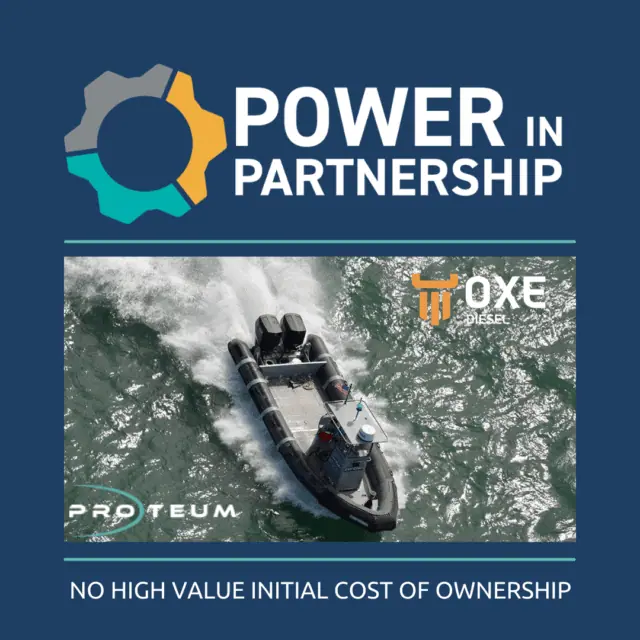
Proteum unveils `Power in Partnership` scheme for OXE Diesel in industry first for marine propulsion
Proteum, UK & Ireland distributor for OXE Diesel, has unveiled `Power in Partnership`, a combined payment and servicing scheme enabling OXE Diesel operators avoid a high upfront purchase cost and only pay for the hours the engine is working.
`Power in Partnership` is thought to be the marine propulsion industry’s first `pay per hour` scheme and has been designed by Proteum for OXE commercial customers derived from a model used for commercial aero engines.
Customers pay for the engine rigging kit upfront and then a cost per hour used on a monthly basis, with a minimum usage of 500 hours per year. The hourly rate covers all servicing and repairs over a 5 year or 5,000 hour period.
A remote engine monitoring system, ‘S.M.A.R.T. Engineer’, maximises uptime by supplying real-time data from up to four engines on one boat. By measuring the engine parameters such as, coolant temperature, oil, fuel and turbo pressures, automated warnings alert operators and support engineers of any possible pending issue, enabling a problem to be resolved during a planned service visit and thus reducing downtime.
“Customers gain the safety, availability and cost benefits of OXE diesel without the higher purchase cost and only pay while the boat is earning for them. With `Power in Partnership` we are “putting our money where our mouth is” and demonstrating our faith in the reliability of OXE engines”, said Neil Taylor, Head of Proteum.
Over 800 OXE Diesel outboards are working on salmon farm and fishing boats, ferries, workboats, patrol and fast rescue craft. The range offers 125HP, 150HP, 175HP, 200HP and 300HP options to meet different user specifications.
About OXE Diesel
OXE is designed primarily for commercial users to achieve high levels of reliability – it has no weak links such as dog clutches, vertical drive shafts or gearboxes below the waterline. It uses a belt-drive system that is more durable than bevel gears and allows for the diesel’s increased torque to be transferred more efficiently to the propeller shaft. This also allows for the development of other high torque applications such as hybrid and full electric.












